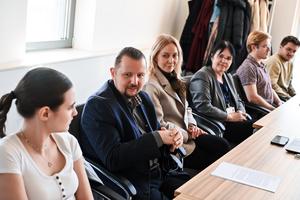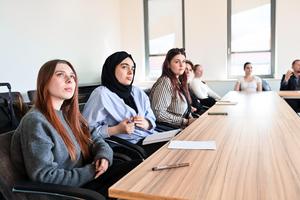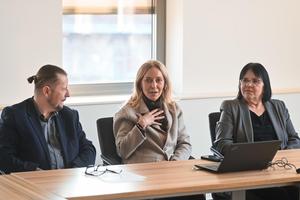How can cooperation between Central European countries become more fruitful? What is happening in Germany? How does the conflict in Gaza or the seemingly distant conflict in Taiwan affect our lives? These were some of the topics discussed by international experts at the university.
An initiative to strengthen inter-institutional and student-to-student cooperation was launched last year by the student community of the Bratislava International School of Liberal Arts (BISLA) and the International and European Student Advanced College of the Faculty of Public Governance and International Studies of Ludovika University of Public Service (LUPS). At the invitation of the latter, BISLA faculty and students came to the Ludovika Campus from 17-19 February 2025 to reflect together on the challenges of the changing world order in a three-day intensive joint workshop in response to the last visit to Bratislava. As part of the workshop, participants also discussed current geopolitical challenges in the world, led by LUPS and BISLA lecturers, on Tuesday 18 February at the Education Centre.
Our region is facing complex challenges today, which is why cooperation between countries at the academic level is so important," said Péter Krisztián Zachar, Vice-Dean for International Affairs, associate professor at the Department of International Relations and Diplomacy, in his introductory speech.
"Germany is our country's number one trading partner, so one little sneeze could put the Hungarian economy to bed" - this was already emphasised by assistant lecturer Gyula Speck. He explained to the students "What can be expected in Germany? Germany's role in Europe after the federal elections".
In her lecture entitled "Humanitarian Rights: lessons from the past and challenges ahead", Dean Réka Varga, associate professor and head of the Department of International Law, stressed that conflicts have changed radically since the 1990s, as the warring parties are less recognisable and hide among civilians.
"Taiwan is closer to us than we might think from the map," said András Bartók, senior lecturer at the Department of International Relations and Diplomacy, in his lecture on "The geostrategic consequences of a potential conflict in the Taiwan Strait", "because the technological tools that come from there affect all of us in our daily lives."
"In the last one month Trump has not yet made any territorial claims in Africa" – joked Viktor Marsai, associate professor, at the beginning of his lecture entitled "From periphery to periphery: changes in US Africa policy". Thus, if the continent is lucky, it is not political leaders but experts who implement US Africa policy.
When did the Gaza conflict start? What is its purpose? What does the term terrorist organisation mean? Is there a lasting solution to the Gaza crisis? - These were the main topics addressed by professor Erzsébet Nagyné Rózsa in her lecture entitled "What are the questions of the war in Gaza?"
The three-day event also included a simulation exercise led by András Bartók, which modelled the impact of a fictional conflict at the borders of Europe. The students visited the Hungarian Parliament and held social events. At the end of the visit, the Hungarian and visiting students participated in a training and workshop focusing on academic writing, led by Virág Novák-Varró, assistant lecturer of the Department of International Security Studies at the Faculty of Military Sciences and Officer Training.
You can read more about the workshop in the article of the university's scientific portal, ludovika.hu in Hungarian.
Text: Tibor Sarnyai
Photos: Dénes Szilágyi



